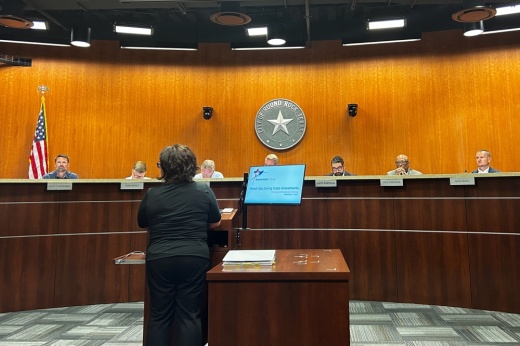Round Rock residents provided feedback to the city's Planning & Zoning Commission Sept. 3 on proposed changes to the city's downtown area.
What you need to know
Members of the public were invited to provide feedback at the commission meeting, which included a public hearing on proposed updates to the city's downtown district.
As reported by Community Impact, the proposed amendments to Round Rock’s zoning would expand the downtown boundaries, increase the density allowed on Mays Street and Round Rock Avenue, and provide for taller buildings in certain parcels of downtown, among other changes.
Brad Dushkin, director of planning and development services, said at the hearing that the proposal comes from a desire to provide more diverse dining, retail and entertainment opportunities to residents in the downtown area.
The details
Certain segments of downtown would be rezoned to a mixed-use medium density district, allowing for four different building types ranging from two and a half stories to 12 stories.
If approved by the commission and City Council, other segments would be rezoned from single-family parcels to mixed-use limited districts, designed to allow limited commercial uses while also maintaining the area’s residential look, according to city documents.
Lastly, certain parcels of land would be rezoned as open space districts, including the area surrounding the city’s Town Green project. This project will upgrade the square around the city’s historic water town, creating wooden deck seating, turf lawns, food truck parking, renovations of the Johnson building.
What they're saying
Joelle Jordan, long-range planning manager for the city of Round Rock, said the proposal is geared toward increasing housing density in the downtown area, while still maintaining what the area is known to be by the people who live there.
However, residents and business owners shared their reservations, mostly around how increased density could impact traffic and the overall feel of downtown, as well as current infrastructure being able to support this additional density.
Judy Anderson, president of Preservation Round Rock, said she appreciates the efforts by city staff to engage with the public, but the proposed amendments could make way for development that fundamentally changes downtown.
"Allowing that height for buildings in the main downtown area is excessive and would forever change the look and feel of Round Rock and destroy the efforts to preserve Round Rock's unique charm," Anderson said.
Brent Campbell, a commercial real estate agent for Don Quick & Associates who also owns a building on Main Street, said he has sold over 20 commercial properties in the downtown area. His experience working in real estate and managing his own office and retail space lead him to two major concerns about increasing density in downtown: water retention and parking.
He lost a tenant last year due to a lack of available parking, he said.
Regarding concerns about traffic and infrastructure, Dushkin highlighted the city's roadway impact fee program, which requires developers to pay fees for their anticipated impact to adjacent city roads. This fee funds road improvements, similar to the city's water and wastewater impact fees. Should a developer's project require more infrastructure than exists on a given site, they are also required to fund the cost of construction, he said.
What's next?
Commissioners approved the amendments to the code as presented. The next step in the process requires the proposed amendments be considered by City Council at a future meeting.





